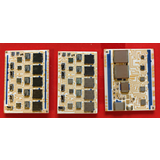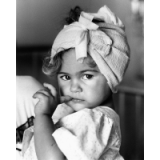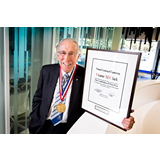Person
Clark, Graeme Milbourne (1935 - )
AC FAA FTSE FRS HonFRCS
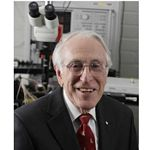
Graeme Clark, courtesy of Graeme Clark.
Details
- Born
- 16 August 1935
Camden, New South Wales, Australia - Occupation
- Otolaryngologist, Neuroscientist, Speech Scientist and Bioengineer
Summary
Graeme Clark became Professor of Otolaryngology at the University of Melbourne in 1970. From 1999 to 2004, he was promoted to Laureate Professor at the University of Melbourne. Clark was the leader of the team that developed the cochlear implant (bionic ear). The focus of his research was to enable profoundly deaf people to hear speech. His research team also developed other hearing devices, such as the electrotactile hearing aid, the "Tickle Talker". Clark's cochlear implant became a world leader in its field, assisted in its development by Cochlear Ltd, and his team continued to engage in ground-breaking research into deafness for many years. In 2005, he was appointed Laureate Professor Emeritus at the University of Melbourne, and in 2014 became Honorary Professor of Electrical Engineering.
Details
Summary of Graeme Clark's Discoveries Using Electrical Stimulation of the Brain (1967-)
Perception: Psychophysics
Temporal coding is essential for perception of low pitches and voicing; Place coding is essential for perception of timbre, vowels and consonants; Place coding of frequency requires early exposure to sound; Place coding is necessary for speech perception; Separate brain channels are required for temporal and place coding; Averaging over site of stimulation varies place pitch. Electrical charge is essential for coding loudness.
Speech and Language
Place coding is essential for frequency transitions in speech; Electrical excitation of the brain underlies the conscious experience of speech; Formant codes are important for understanding running speech; Speech coding is retained in memory after exposure to sound; Speech coding in a young child leads to good spoken language; Voicing integrates timing of place coded information for conscious experience of speech; Electrical excitation, and synapse connectivity and/or protein changes are suggested to underlie memory for speech sounds.
Bioengineering of the multi-channel cochlear implant (Bionic Ear)
Clark's first scientific achievement in the development of the bionic ear was in 1967. He demonstrated with neurophysiological studies the limitations of the temporal (rate) coding of electrical stimulation, and the need for stimulating different sites in the brain corresponding to a range of speech frequencies (place coding). He discovered in 1975 the best method of placing electrodes in the cochlea for safe and effective place coding.
Working with his engineers, he created the first prototype fully implantable multi-channel cochlear implant. In addition, as senior surgeon he led the surgical implantation of this prototype receiver-stimulator at the Royal Victorian Eye and Ear Hospital on 1 August 1978.
Then working closely with PhD student Joe Tong, he became the first to explore the range of percepts from multi-channel electrical stimulation. This showed that the brain coded rate and place of stimulation through separate channels, and that a rapid shift in place coding could code consonants, which was essential for speech understanding.
His major breakthrough came when he realised that stimulating different sites in the brain affected not only the timbre or quality of the pitch, but also the perception of vowels. As a result - and together with colleagues - he showed how to code speech for its understanding. This made his work the first to bring electronic technology into a functional relation with the central nervous system. He then helped initiate - with funding from the federal government - the biomedical firm Cochlear Pty Ltd, which became the leader in this field for more than 30 years.
After appropriate safety studies in 1985, Clark became the first to insert a multi-channel implant in a child. His clinical team found that when profoundly deaf children were implanted as young as one year of age they could develop near-normal spoken language. In 1989, he was also the first to combine hearing in one ear with an implant in the other, and in 1990 successfully investigated implants in both ears.
He continued multi-disciplinary research to improve the performance of the bionic ear, and created the discipline Medial Bionics. This has formed the basis for bionic stimulation of the spinal cord in paraplegia, stimulating the eye for blindness, deep brain stimulation for drug resistant epilepsy and other bionic devices.
Chronology
- 1958
- Career position - Junior Resident Medical Officer, Royal Prince Alfred Hospital, Sydney.
- 1959
- Career position - Senior Resident Medical Officer, Royal North Shore Hospital, Sydney.
- 1960
- Career position - Lecturer in Anatomy, University of Sydney.
- 1961
- Career position - Registrar in General Surgery (Neurosurgery) and Otolaryngology, Royal Prince Alfred Hospital, Sydney.
- 1962
- Career position - Senior House Surgeon, Royal National Ear Nose and Throat Hospital, London.
- 1963
- Career position - Senior Registrar in Otolaryngology, Bristol General Hospital, and Lecture in Otolaryngology at Bristol University.
- 1963 - 1966
- Career position - Senior Assistant Ear Nose and Throat (ENT) Surgeon, Royal Victorian Eye and Ear Hospital.
- 1964 - 1966
- Career position - First Assistant to the Ear Nose and Throat (ENT) Surgeon, Alfred Hospital, Melbourne.
- 1965
- Career position - Senior Visiting Ear Nose and Throat (ENT) Surgeon, Repatriation General Hospital, Heidelberg.
- 1966 - 2004
- Career position - Senior Honorary Ear Nose and Throat and Head and Neck Surgeon, Royal Victorian Eye and Ear Hospital.
- 1967 - 1968
- Career position - Lecturer in Physiology, University of Sydney.
- 1968
- Research - Master of Surgery (MS), University of Sydney - awarded for thesis entitled 'the Principles of the Structural Support of the Nose and their Application to Nasal and Septal Surgery'.
- 1968
- Career position - Consultant Otolaryngologist to Royal Melbourne, the Royal Women's, the Alfred and Prince Henry's hospitals.
- 1968 - 1973
- Career position - Consultant Otolaryngologist, Commonwealth Acoustic Laboratories.
- 1969
- Career position - Senior Research Officer, National Health and Medical Research Council of Australia.
- 1969
- Research - Doctor of Philosophy (PhD), Univeristy of Sydney - awarded for thesis entitled "Middle ear and neural mechanisms in hearing and in the management of deafness".
- 1970
- Award - Bertha Sudholz Prize, University of Adelaide
- 1970 - 2004
- Career position - William Gibson Professor of Otolaryngology and Chairman, Department of Otolaryngology, University of Melbourne.
- 1977
- Patent - Hearing Prosthesis - Improvements in Prosthesis - awarded to G. Clark, J. Patrick, I. Forster, Y. Tong and R. Black.
- 1978
- Patent - Hearing Prosthesis - Improved Electrode Array - awarded to G. Clark, J. Patrick and Q. Bailey.
- 1979
- Patent - Improvements to Speech Processor - awarded to G. Clark, J. Patrick, J. Millar, P. Seligman and Y. Tong.
- 1982
- Patent - Hearing Prosthesis - Receiver/Stimulator - awarded to H. McDermott, P. Blamey, R. Black, G. Clark, D. Money, J. Patrick, Y. Tong.
- 1983
- Award - Officer of the Order of Australia (AO) - In recognition of service to medicine
- 1984 - 1993
- Career position - Chief Investigator of National Health & Medical Research Council Program Grant: "Studies to Develop Sensory Prostheses for Deaf Children and Adults".
- 1984 - 1994
- Career position - Chief Investigator of two US National Institutes of Health Grants (Improved Cochlear Implant: Psychophysics and Engineering" and An Advanced Multi-Channel Cochlear Implant for Deafness".
- 1985
- Patent - Hearing Prosthesis - Prosthetic 'Flippy Tip' Electrode Array - awarded to G. Clark and H. Franz Hearing Prosthesis - Prosthetic 'Flippy Tip' Electrode Array.
- 1985
- Award - J.M. Crouch Fellow, Royal Australasian College of Surgeons.
- 1985 - 1992
- Career position - Chief Investigator of two US National Institutes of Health Contracts (Speech processors for auditory prostheses, NIH Contract No1-DC-9-2400 and Pediatric auditory prosthesis implants NIH Contract No1-NS-7-2342).
- 1985 - 2004
- Career position - Founder and Surgeon-in-charge of the Cochlear Implant Clinic, Royal Victorian Eye and Ear Hospital.
- 1985 - 2005
- Career position - Founder and Director of the Bionic Ear Institute.
- 1986
- Award - Rotary Vocational Service Award
- 1986
- Award - Advance Australia Award
- 1988 - 1993
- Career position - Director, The Australian Research Council's Special Research Centre the Human Communication Research Centre, East Melbourne, Australia.
- 1989
- Award - Doctor of Medicine (MD), honoris causa, University of Sydney.
- 1990
- Award - Medal of Merit, Lions Clubs.
- 1990
- Patent - Hearing Prosthesis - Bimodal Speech Processor - awarded to P. Blamey, G. Dooley, G. Clark, P. Seligman.
- 1991
- Award - James Cook Medal, Royal Society of New South Wales.
- 1992
- Patent - Curved 22-Channel Intracochlear Electrode Array - awarded to S. Xu, J. Xu, H. Seddon, F. Neilson, G. Clark, R. Shepherd.
- 1992
- Award - First Honorary Fellow, Audiological Society of Australia.
- 1992
- Award - Clunies Ross National Science and Technology Award, Ian Clunies Ross Memorial Foundation
- 1992 - 1997
- Career position - Founder and Director, Co-operative Research Centre for Cochlear Implant, Speech and Hearing Research, East Melbourne, Australia.
- 1994
- Patent - Transient Emphasis Speech Processing - awarded to A. Vandali and G. Clark.
- 1994
- Patent - Cochlear Implant System for Residual Hearing Stimulation - awarded to A. Vandali and G. Clark.
- 1994
- Patent - Multiple Pulse Per Period (MP3) Electrical Stimulation Strategy for Cochlear Implants awarded to Irlicht and G. Clark.
- 1995
- Patent - Cochlear Implant Devices - awarded to G. Clark, L. Cohen and P. Busby.
- 1997
- Award - Sir William Upjohn Medal, University of Melbourne (awarded every five years for outstanding contributions to medicine).
- 1998
- Award - Doctorate of Medicine (MD), honoris causa, Medizinishche Hochschule, Germany.
- 1998
- Award - Fellow, Australian Academy of Technological Sciences and Engineering (FTSE)
- 1998
- Award - Fellow, Australian Academy of Science (FAA)
- 1999
- Award - National Australia Day Council, Australian Achiever's Award (for pioneering research to enable the profoundly deaf to hear).
- 1999
- Award - Victoria Prize
- 1999
- Award - Rio Tinto Science Hero's Award - Industry
- 1999
- Award - Australian Achiever Award
- 1999 - 2004
- Career position - Laureate Professor, University of Melbourne.
- 2000
- Award - Cavalcade of Science Honour Award, Australian Institute of Political Science.
- 2001
- Patent - A Travelling Wave Sound Processor - awarded to P. Blamey, H. McDermott, B. Swanston, J. Patrick and G. Clark.
- 2001
- Award - Centenary Medal - for being a pioneer of world-leading Australian Bionic Ear, providing hearing to over 25,000 people
- 2001
- Award - Senior Australian of the Year (for outstanding contribution to the welfare of Australians and international commitment).
- 2002
- Award - Doctor of Science (DSc), honoris causa, University of Wollongong.
- 2002
- Award - Aram Glorig Award, International Society of Audiology.
- 2002
- Award - Graeme Clark Room established at the Ear Foundation, Marjorie Sherman House, Nottingham UK.
- 2002
- Award - Honorary Member, American Otological Society.
- 2003
- Organisation - The Graeme Clark Cochlear Scholarship Foundation established.
- 2003
- Award - Honorary Fellow, Royal Society of Medicine, London.
- 2003
- Award - Doctorate of Engineering (DEng), honoris causa, Chung Yuan Christian University, Taiwan.
- 2004
- Award - Prime Minister's Prize for Science, Commonwealth of Australia
- 2004
- Award - Fellow, The Royal Society, London (FRS).
- 2004
- Award - Companion of the Order of Australia (AC) - for service to medicine and to science through innovative research to further the development of cochlear implant technology for worldwide benefit
- 2004
- Award - Fellow, Australian Acoustical Society.
- 2004
- Award - Australian Father of the Year Award (for his vision, determination and pioneering work in developing the bionic ear).
- 2004
- Award - Honorary Fellow, Royal College of Surgeons of England.
- 2004
- Career position - Laureate Professor Emeritus, University of Melbourne.
- 2004
- Award - Doctorate of Laws (LLD), honoris causa, Monash University.
- 2005
- Career position - Emeritus Otolaryngologist, Royal Victorian Eye and Ear Hospital.
- 2005
- Award - Excellence in Surgery Award, Royal Australasian College of Surgeons.
- 2005
- Award - International Speech Communication Association Medal
- 2005
- Career position - Director Emeritus, Royal Victorian Eye and Ear Hospital.
- 2005
- Award - Royal College of Surgeons of Edinburgh Medal
- 2005
- Award - A. Charles Holland Foundation International Prize
- 2005 - 2007?
- Career position - Lead Research Scientist in establishing the State Government of Victoria's Science, Technology and Innovation (STI) program, with the aim of bringing research and industry together to produce industrial outcomes.
- 2005 - 2012
- Career position - Bionics Program Leader, Australian Research Council Centre of Excellence for Electromaterials Science.
- 2006
- Career position - Director Emeritus, The Bionic Ear Institute.
- 2006
- Award - Ian Wark Medal and Lecture, Australian Academy of Science.
- 2006? - 2008?
- Research - Member of the Expert Advisory Committee of the Australian Research Council.
- 2007
- Award - Zülch prize, Getrud Reemstsma Foundation, administered by the Max Planck Society, Cologne (Köln).
- 2007
- Award - Lifetime Achievement Award, Faculty of Medicine, Nursing and Health Sciences, Monash University.
- 2007
- Award - Fellow, American Institute of Medical and Biological Engineering.
- 2007
- Lecture - The Australian Broadcasting Commission's Boyer Lectures on 'Restoring the Senses' established.
- 2008
- Organisation - The Graeme Clark Foundation established. It funded the Graeme Clark Chair in Audiology and Speech Science, and helped to sustain research and support into bionic ear and medical bionics generally.
- 2008
- Lecture - Inaugural Graeme Clark Oration, held annually at the University of Melbourne, delivered by Graeme Clark.
- 2009
- Organisation - The Graeme Clark Centre for Innovation in the Sciences, The Scots College, Sydney, established.
- 2009
- Award - Honorary Bragg Membership, Royal Institute of Australia.
- 2009
- Award - Otto Schmidt Award, International Federation of Medical and Biological Engineering.
- 2009 - 2011
- Career position - Distinguished Professor, La Trobe University (the first Distinguished Professor appointed to La Trobe University).
- 2010
- Award - Doctorate, honoris causa, University of Zarogoza, Spain.
- 2010
- Award - Lister Medal, Royal College of Surgeons of England and Glasgow, Royal Society, Edinburgh University.
- 2011
- Award - CSL Florey Medal, Australian Institute of Policy and Science
- 2011
- Organisation - The Graeme Clark Research Institute, Tabor College, Adelaide, established.
- 2011
- Award - Zotterman Medal, Nobel Institute for Neurophysiology, Karolinska Institutet, Stockholm.
- c. 2012 - c. 2014
- Career position - Professorial Fellow, Department of Electrical Engineering, University of Melbourne, through the National Information Communications Technology Centre of Excellence (NICTA).
- 2013
- Award - Graeme Clark Room established at Cochlear Centre in Macquarie University. Sydney
- 2013
- Award - Doctor of Health Sciences, honoris causa, University of Technology, Sydney.
- 2013
- Career Position - The Graeme Clark Chair in Audiology and Speech Science, University of Melbourne, established by the Graeme Clark Foundation and the University of Melbourne.
- 2013
- Award - Fellow, National Academy of Inventors, United States.
- 2013
- Award - Lasker-DeBakey Clinical Medical Research Award, Lasker Foundation, New York.
- 2014
- Award - Graeme Clark Room established at Cochlear Care Centre, Melbourne.
- 2014
- Career position - Honorary Professor of Electrical Engineering, University of Melbourne.
- 2014
- Lecture - The Clark Lecture Series at Scots College Sydney is established.
- 2015
- Award - Fritz, J. and Dolores H. Russ Prize, National Academy of Engineering, Washington DC, and Ohio University.
- 2015
- Award - Medal from Paul Sabatier University
- 2016
- Award - Life Membership, Australasian Society of Otolaryngology Head and Neck Surgery - awarded on 7th March 2016.
- 2016
- Lecture - Gave the Norbet Weiner Lecture (Norbet Weiner is a key figure in cybernetics which is used to develop the Bionic Ear).
Related entries
Archival resources
Museums Victoria
- Bionic Ear Collection [Artefacts], 1968 - 1990, Bionic Ear Collection; Museums Victoria. Details
National Archives of Australia, National Office
- Professor Graeme Clark - Miniature Bionic Ear, 01 Jan 1948 - 31 Dec 1997, A9984, 1558588; National Archives of Australia, National Office. Details
- Professor Graeme M Clark - General Representations (3002), 11 November 1980 - 23 April 1987, A463, 1986/G1182; National Archives of Australia, National Office. Details
National Film and Sound Archive of Australia
- Graeme Clark/bionic ear collection [National Film and Sound Archive of Australia], 1956 - 2009; National Film and Sound Archive of Australia. Details
National Library of Australia
- Graeme Clarke interviewed by Daniel Connell in the Australian Academy of the Humanities Fellows oral history project, ORAL TRC 6540/3; National Library of Australia. Details
- Interview with Prof. Graeme Clarke, Director of Bionic Ear Institute and Laureate Professor of Otolaryngology [sound recording] / interviewer, Diana Giese, 3 October 2002, TRC 4897; National Library of Australia. Details
National Library of Australia Manuscript Collection
- Papers of Graeme M. Clark, 1944-2012 [manuscript], 1944 - 2012, MS 8696; National Library of Australia Manuscript Collection. Details
National Museum of Australia
- Graeme Clark, University of Melbourne - Cochlear Limited collection, 1970? - 2005?, http://collectionsearch.nma.gov.au/ce/Graeme%20clark%20university%20of%20melbourne%20cochlear%20limited%20collection; National Museum of Australia. Details
- Presentation plaque incorporating bionic ear circuit board [Peter Howson collection], 1980; National Museum of Australia. Details
Private hands (Clark, G.M.)
- Graeme Milbourne Clark - Records, 1970 - 1988; Private hands (Clark, G.M.). Details
Records Services, The University of Melbourne
- T2005/025: NIH Grant Applications, 1987 - 1998; Professor Graeme Clark; Records Services, The University of Melbourne. Details
- T2005/027: Bionic Ear Institute - Institute Establishment Files, 1984 - 1987; Professor Graeme Clark; Records Services, The University of Melbourne. Details
- T2005/028: Bionic Ear Institute - Bionic Ear Institute Financial Records, 1988 - 1993; Professor Graeme Clark; Records Services, The University of Melbourne. Details
- T2005/029: Bionic Ear Institute - Pamphletts, Brochures, Publications, 1974 - 2003; Professor Graeme Clark; Records Services, The University of Melbourne. Details
- T2005/032: Bionic Ear Institute - Graeme Clarke Correspondence, 1968 - 1997; Professor Graeme Clark; Records Services, The University of Melbourne. Details
- T2005/037: Bionic Ear Institute - Graeme Clark - Home/Office Files, 1970 - 2005; Professor Graeme Clark; Records Services, The University of Melbourne. Details
- T2005/055: 2005 Transfers - Finding Aids and Supporting Documents, 1990s - 2000s; Records Services, The University of Melbourne. Details
The University of Melbourne Archives
- Department of Otolaryngology - Bionic Ear Records, 1949 - 2000, 2004.0043 at U77/46-55; The University of Melbourne Archives. Details
- Official Opening, Department of Ophthalmology and Otolaryngology, Royal Victorian Eye and Ear Hospital, 1971, 2014.0110; The University of Melbourne Archives. Details
- University of Melbourne. Department of Otolaryngology, 1965 - 1989, 1990.0165; The University of Melbourne Archives. Details
- University of Melbourne. Department of Otolaryngology, 1969 - 1981, 1982.0111; The University of Melbourne Archives. Details
- University of Melbourne. Department of Otolaryngology, 1959 - 1964, 2000.0005; The University of Melbourne Archives. Details
Published resources
Books
- [Biographical cuttings on Prof. Graeme Clark, awarded the BHP Pursuit of Excellence award, for pioneering work with people with impaired hearing, containing one or more cuttings from newspapers or journals] (). Details
- Bondarew, Veronica and Seligman, Peter, The Cochlear Story (Canberra: CSIRO, 2012), 248 pp. Details
- Clark, G. M.; in collaboration with Blamey, P. J. [et al.], The University of Melbourne-nucleus multi-electrode cochlear implant (New York: Karger Basel, 1987). Details
- Clark, Graeme M., Sounds from silence : Graeme Clark and the bionic ear story (Crows Nest, NSW: Allen & Unwin, 2000). Details
- Clark, Graeme M., Restoring the Senses (Sydney, NSW: ABC Books for the Australian Broadcasting Commission, 2007). Details
- Clark, Graeme M., Sounds from silence : Graeme Clark and the bionic ear story (Crows Nest, NSW: Allen & Unwin, 2017). Details
- Clark, Graeme M., I want to fix ears: inside the Cochlear implant story (Forest Hill, Vic.: ISCAST, 2021), 282 pp. Details
- Clark, Graeme M.; and Cowan, Robert S.C., International Cochlear Implant Speech and Hearing Symposium : Melbourne 1994 (St Louis, Mo: Annals Publishing Company, 1995), 468 pp. Details
- Clark, Graeme Milbourne, Science and God: Reconciling Science with the Christian Faith (Surry Hills, NSW: Anzea, 1979), 55 pp. Details
- Clark, Graeme Milbourne, Cochlear implants: Fundamentals and Applications (New York: Springer Verlag, 2003), 830 pp. Details
- Clark, Graeme Milbourne; Blamey, Peter. J.; Brown, A. M.; Busby, P. A.; Dowell, R. C.; Franz, B. K.; Pyman, B. C.; Shepherd, R. K.; Tong, Y. C.; Webb R. L.; Hirshorn, M. S.; Kuzma, J. A.; Mecklenburg, D. J.; Money, D. K.; Patrick, J. F.; Seligman, P. M., Nucleus Multi-electrode Cochlear Implant (Advances in Oto-Rhino-Laryngology), vol. 38 (Basel: Karger, 1987). Details
- Epstein, June, The Story of the Bionic Ear (Hyland House, 1989). Details
- Knight, Linsay and Cheng, Christopher, Australia's Greatest Inventions and Innovations (North Sydney, N.S.W.: Random House Australia, 2012), 184 pp. Pages 2-5 (Bionic ear 2-5). Details
- Worthing, Mark, Graeme Clark: The Man Who Invented the Bionic Ear (Crows Nest: Allen & Unwin, 2015), 221 pp. Details
Book Sections
- Clark, Graeme Milbourne, 'Cochlear Implants: Historical Perspectives' in Profound Deafness and Speech Communications, Plant, Geoff and Spens, Karl-Erik, eds (London: Whur Publishers, 1995). Details
- Clark, Graeme Milbourne, 'Learning to understand speech with the cochlear implant' in Perceptual Learning, Fahle, M. and Poggiio, T., eds (Cambridge: MIT Press, 2002), pp. 147-60. Details
- Clark, Graeme Milbourne, 'Cochlear Implants' in Springer Handbook of Auditory Research: Speech processing in the auditory system, Greenberg, S., ed. (New York: Springer-Verlag, 2003). Details
- Clark, Graeme Milbourne; Black, R. C.; Patrick, J. F.; Tong, Y. C., 'Design criteria of a multiple-electrode cochlear implant hearing prosthesis' in Sensory Aids for the Hearing Impaired, Levitt, H., Pickett, J. M., and Houde, R., eds (New York: IEEE Press, 1980), pp. 457-9. Details
Journal Articles
- Anon, 'Graeme Clark shares Russ Prize in US', ATSE focus, 188 (2015), 43, https://nla.gov.au/nla.obj-3171718694. Details
- Blamey, P. J.; Dooley, G. J.; Parisi, E. S.; Clark, G. M., 'Pitch comparisons of acoustically and electrically evoked auditory sensations', Hearing Research, 99 (1996), 139-50. Details
- Busby, P. A.; Clark G. M., 'Pitch estimation by early-deafened subjects using a multiple-electrode cochlear implant', Journal of the Acoustical Society of America, 107 (2000), 547-58. Details
- Busby, P. A.; Clark, G. M., 'Pitch and loudness estimation for single and multiple pulse per period electric pulse rates by cochlear implant patients', Journal of the Acoustical Society of America, 101 (1997), 1687-95. Details
- Busby, P. A.; Tong, Y. C.; Clark, G. M., 'The perception of temporal modulations by cochlear implant patients', Journal of the Acoustical Society of America, 97 (1993), 124-31. Details
- Busby, P. A.; Tong, Y. C.; Hollow, R. D.; Clark, G. M., 'Psychophysical and speech perception studies" A case report on a binaural cochlear implant subject', Audiology, 31 (1992), 95-111. Details
- Chen, B. K.; Clark G. M.; Jones, R., 'Evaluation of trajectories and contact pressures for the straight nucleus cochlear implant electrode array: A two-dimensional application of finite element analysis', Medical Engineering and Physics, 2 (2003), 141-7. Details
- Chung, King, 'From the Editor', Trends in Amplification, 10 (4) (2006), 173-174, http://www.ncbi.nlm.nih.gov/pmc/articles/PMC4111376/. Details
- Clark, G. M., 'Responses of cells in the superior olivary complex of the cat to electrical stimulation of the auditory nerve', Experimental Neurology, 24 (1) (1969), 124-36. Details
- Clark, G. M., 'A hearing prosthesis for severe perceptive deafness ̶ experimental studies', Journal of Laryngology and Otology, 87 (10) (1973), 929-45. Details
- Clark, G. M.; Black, R. C.; Forster, I. C.; Patrick, J. F.; Tong, Y. C., 'Design criteria of a multiple-electrode cochlear implant hearing prosthesis', Journal of Acoustical Society of America, 63 (1978), 631-3. Details
- Clark, G. M.; Blamey, P. J.; Busby, P. A.; Dowell, R. C.; Franz, B. K. - H. G.; Musgrave, G. N.; Nienhuys, T. G. W.; Pyman, B. C.; Roberts, S. A.; Tong, Y. C.; Well, R. L.; Kuzma, J. A.; Money, D. K.; Patrick, J. F.; Seligman, P. M., 'A multiple-electrode intracochlear implant for children', Archives of Otolaryngology, 113 (1987), 825-8. Details
- Clark, G. M.; Busby, P. A.; Roberts, S. A.; Dowell, R. C.; Tong, Y. C.; Blamey, P. J.; Nienhuys, T. G. W.; Mecklenburg, D. J.; Well, R. J.; Pyman, B. C.; Franz, B. K. - H. G.,, 'Preliminary results for the Cochlear Corporation multi-electrode intracochlear implants on six prelingually deaf patients', American Journal of Otology, 8 (1987), 234-9. Details
- Clark, G. M.; Crosby, P. A.; Dowell, R. C.; Kuzma, J. A.; Money, D. K.; Patrick, J. F.; Seligman, P. M.; Tong, Y. C., 'The preliminary clinical trial of a multi-channel cochlear implant hearing prosthesis', Journal of the Acoustical Society of America, 74 (1983), 1977-14. Details
- Clark, G. M.; Hallworth, R. J., 'A multiple-electrode array for a cochlear implant', Journal of Laryngology and Otology, 90 (1976), 623-7. Details
- Clark, G. M.; Hallworth, R. J.; Zdanius, K., 'A cochlear implant electrode', Journal of Laryngology and Otology, 89 (1975), 787-92. Details
- Clark, G. M.; Kranz, H. G.; Minas, H., 'Behavioral thresholds in the cat to frequency modulated sound and electrical stimulation of the auditory nerve', Experimental Neurology, 41 (1973), 190-200. Details
- Clark, G. M.; Patrick, J. F.; Bailey, Q. R., 'A cochlear implant round window electrode array', Journal of Laryngology and Otology, 93 (1979), 107-9. Details
- Clark, G. M.; Pyman, B. C.; Bailey, Q. R., 'The surgery for multiple-electrode cochlear implantations', Journal of Laryngology and Otology, 93 (1979), 215-23. Details
- Clark, G. M.; Shepherd, R. K.; Franz, B. K. - H. G.; Dowell, R. C.; Tong, Y. C.; Blamey, S.; Webb, R. L.; Pyman, B. C.; McNaughton, J.; Kakulas, B. A.; Siejka, S., 'The histopathology of the human temporal bone and auditory central nervous system following cochlear implantation in a patient: Correlation with psychophysics and speech perception results', Acta Oto-Laryngologica (1988), 1-65. Details
- Clark, G. M.; Tong, Y. C.; Black, R. C.; Forster, I. C.; Patrick, J. F.; Dewhurst, D. J., 'A multiple-electrode cochlear implant', Journal of Laryngology and Otology, 91 (1977), 935-45. Details
- Clark, G. M.; Tong, Y. C.; Dowell, R. C., 'Clinical results with a multi-channel pseudobulbar system', Annals of the New York Academy of Sciences, 405 (1983), 370-7. Details
- Clark, G. M.; Tong, Y. C.; Dowell, R. C., 'Comparison of two cochlear implant speech-processing strategies', Annals of Otology, Rhinology and Laryngology, 93 (1984), 127-31. Details
- Clark, G. M.; Tong, Y. C.; Martin, L. F., 'A multiple-channel cochlear implant. An evaluation using closed-set spondiac words', Journal of Laryngology and Otology, 95 (1981), 461-4. Details
- Clark, G. M.; Tong, Y. C.; Martin, L. F. A.; Busby, P. A.; Dowell, R. C.; Seldon, H. L.; Patrick, J. F., 'A multiple-channel cochlear implant. An evaluation using nonsense syllables', Annals of Otology, Rhinology and Laryngology, 90 (1981), 227-30. Details
- Clark, G. M.; Tong, Y. C.; Martin, L. F.; Busby, P. A., 'A multiple-channel cochlear implant. An evaluation using an open-set word test', Acta Oto-Laryngologica, 91 (1981), 173-5. Details
- Clark, G. M.; Tong, Y. C.; Patrick, J. F.; Seligman, P. M.; Crosby, P. A.; Kuzma, J. A.; Money, D. K., 'A multi-channel hearing prosthesis for profound-to-total hearing loss', Journal of Medical Engineering and Technology, 8 (1984), 3-8. Details
- Clark, G.M.; Black, R.C.; Forster I.C.; Patrick, J.F.; Tong, Y.C., 'Design Criteria of a Multiple-electrode Cochlear Implant Hearing Prosthesis', Journal of the Acoustical Society of America, 63 (1978), 631-633. http://hdl.handle.net/11343/28713. Details
- Clark, Graeme Mibourne, 'The multiple-channel cochlear implant: the interface between sound and the central nervous system for hearing, speech, and language in deaf people: a personal perspective', Philosophical Transactions of the Royal Society, 361 (2006), 791-810. Details
- Clark, Graeme Milbourne, 'Personal reflections on the multi-channel cochlear implant and a view of the future', Journal of Rehabilitation Research and Development, 45 (5) (2008), 651-94. Details
- Clark, Graeme Milbourne, 'The multi-channel cochlear implant and the relief of severe-to-profound deafness', Cochlear Implants International, 13 (2) (2012), 69-85. Details
- Clark, Graeme Milbourne, 'The multichannel cochlear implant for severe-to-profound hearing loss', Nature Medicine, 19 (10) (2013), 1236-9. Details
- Clark, Graeme Milbourne, 'The multi-channel cochlear implant: Multi-disciplinary development of electrical stimulation of the cochlea and the resulting clinical benefit', Hearing Research, 322 (2015), 4-13. Details
- Clark, Graeme Milbourne; Clark, J. C.; Furness, J. B.,, 'The evolving science of cochlear implants', Journal of the American Medical Association, 310 (12) (2013), 1225-6. Details
- Cohen, L. T.; Saunders, E.; Clark, G. M., 'Psychophysics of a prototype peri-modiolar cochlear implant electrode array', Hearing Research, 155 (2001), 63-81. Details
- Dahm, M.; Clark, G. M.; Franz, B. K. - H. G.; Shepherd, R. K.; Burton, M. J., 'Cochlear implantation in children: labyrinthitis following pneumococcal otitis media in unimplanted and implanted cat cochleas', Acta Oto-Laryngologica, 114 (1994), 620-5. Details
- Dahm, M.; Shepherd, R. K.; Clark, G. M., 'The postnatal growth of the temporal bone and its implications for cochlear implantation in children', Acta Oto-Laryngologica (1993), 5-39. Details
- Flynn, M. C.; Dowell, R. C.; Clark, G. M., 'Aided speech recognition abilities of adults with a severe hearing loss', Journal of Speech and Hearing Research, 41 (1998), 285-99. Details
- McKay, C. M.; McDermott, H. J.; Clark, G. M., 'Pitch percepts associated with amplitude-modulated current pulse trains in cochlear implantees', Journal of the Acoustical Society of America, 96 (1994), 2664-73. Details
- McKay, C. M.; McDermott, H. J.; Clark, G. M., 'The perceptual dimensions of single-electrode and non-simultaneous dual-electrode stimuli in cochlear implantees', Journal of the Acoustical Society of America, 99 (1996), 1079-90. Details
- Patrick, J. F.; and Clark, G. M., 'The Nucleus 22 - Channel Cochlear Implant System', Ear Hear, 12 (4) (1991), 3S-9S. Details
- Pyman, B.; Blamey, P.; Lacy, P.; Clark, G.; Dowell, R., 'The development of speech perception in children using cochlear implants: Effects of etiologic factors and delayed milestones', American Journal of Otology, 21 (2000), 57-61. Details
- Shepherd, R. K.; Clark, G. M.; Pyman, B. C.; Webb, R. L., 'Banded intracochlear electrode array: Evaluation of insertion trauma in human temporal bones', Annals of Otology, Rhinology and Laryngology, 94 (1985), 55-9. Details
- Surowiecki, V. N.; Sarant, J. Z.; Maruff, P.; Blamey, P. J.; Busby, P. A.; Clarke, G. M., 'Cognitive processing in children using cochlear implants: the relationship between visual memory, attention and executive functions and developing language skills', Annals of Otology, Rhinology and Laryngology, 111 (2002), 119-26. Details
- Tong, Y. C.; Clark, G. M., 'Loudness summation, masking, and temporal interaction for sensations by electric stimulation of two sites in the human cochlea', Journal of the Acoustical Society of America, 79 (1986), 1958-66. Details
- Tong, Y. C.; Clark, G. M.; Blamey, P. J.; Busby, P. A.; Dowell, R. C., 'Psychological studies for two multiple-channel cochlear implant patients', Journal of the Acoustical Society of America, 71 (1982), 153-60. Details
- Tong, Y. C.; Clark, G. M.; Seligman, P. M.; Patrick, J. F., 'Speech processing for a multiple-electrode cochlear implant hearing prosthesis', Journal of the Acoustical Society of America, 68 (1980), 1897-9. Details
- van Hoesel, R. J. M.; Clark, G. M., 'Fusion and laterization study with two binaural cochlear implant patients', Annals of Otology, Rhinology and Laryngology, 104 (suppl. 166) (1995), 233-5. Details
- van Hoesel, R. J. M.; Clark, G. M., 'Psychophysical studies with two binaural cochlear implant subjects', Journal of the Acoustical Society of America, 102 (1997), 495-507. Details
- van Hoesel, R. J. M.; Clark, G. M., 'Speech results with a bilateral multi-channel cochlear implant subject for spatially separated signal and noise', Australian Journal of Audiology, 21 (1999), 23-8. Details
- van Hoesel, R.; Tong, Y. C.; Hollow, R. D.; Clark, G. M., 'Psychological and speech perception studies" A case report on a binaural cochlear implant subject', Journal of the Acoustical Society of America, 94 (1993), 3178-89. Details
- Vandali, A. E.; Whitford, L. A.; Plant, K. L.; Clark, G. M., 'Speech perception as a function of electrical stimulation rate: Using the Nucleus 24 cochlear implant system', Ear and Hearing, 21 (2000), 608-24. Details
- Wei, B. Clark, G.; O'Leary S.; Shepherd, R. K.; Robine-Browne, R., 'Meningitis after cochlear implantation', British Medical Journal, 335 (2007), 1058. Details
Resources
- VIAF - Virtual International Authority File, OCLC, https://viaf.org/viaf/95172620. Details
- Wikidata, http://www.wikidata.org/entity/Q125204. Details
- Graeme Clark Collection, Minerva Access, The University of Melbourne, https://minerva-access.unimelb.edu.au/handle/11343/375. Details
- The Royal Victorian Eye and Ear Hospital, The Royal Victorian Eye and Ear Hospital, 2011, http://www.eyeandear.org.au/. Details
- 'Clark, Graeme Milbourne (1935 - )', Recipients [of the Prime Minister's Prizes for Science, 2000 - 2017], Department of Industry, Innovation and Science, 2017, https://webarchive.nla.gov.au/awa/20171113014642/http://www.science.gov.au/community/PrimeMinistersPrizesforScience/Recipients/2004/Pages/Professor-Graeme-Clark.aspx. Details
- Ian Wark Medal and Lecture, Australian Academy of Science, 2022, https://www.science.org.au/supporting-science/awards-and-opportunities/ian-wark-medal-and-lecture. Details
- Australian Government, National Archives of Australia, Research - Health and food - Professor Graeme Clark and his invention, the Bionic Ear, 1984, Commonwealth of Australia, National Archives of Australia, 2016, http://recordsearch.naa.gov.au/SearchNRetrieve/Interface/ViewImage.aspx?B=11899160. Details
- Bionic Ear: Fact Sheet, Bionics Institute, 2016, http://www.bionicsinstitute.org/publications/Documents/FactSheet_BionicEar.pdf. Details
- '2001 Senior Australian of the Year', Australian of the Year Awards, National Australia Day Council, https://australianoftheyear.org.au/recipients/professor-graeme-clark-ac. Details
- 'Clark, Graeme M (1935-)', Trove, National Library of Australia, 2009, https://nla.gov.au/nla.party-543026. Details
- Bionic Ear Prototype, National Museum of Australia, 2015, http://www.nma.gov.au/collections/highlights/bionic-ear-prototype. Details
- Scala, Bruno, File:Clark-Hochmair-Chouard.jpg, Wikimedia Foundation Inc., 18 June 2015, https://commons.wikimedia.org/wiki/File:Clark-Hochmair-Chouard.jpg?uselang=en-gb#metadata. Details
Resource Sections
- Australian Institute of Policy and Science, 'Florey Medal', Sydney, 2024. https://aips.net.au/florey-award/the-florey-medal/. Details
- O'Leary, Stephen, 'Interview with Professor Graeme Clark', in Interviews with Australian scientists, Australian Academy of Science, 2011, https://www.science.org.au/learning/general-audience/history/interviews-australian-scientists/professor-graeme-clark. Details
- Tully, Helen, 'Graeme Clark's Gift to the World [blog post]', in NFSA Blog, National Film and Sound Archive of Australia website, This blog post documents the life of Graeme Clark and his work on the bionic ear, and includes five videos from the collection held by the National Film and Sound Archive., National Film and Sound Archive of Australia, Commonwealth of Australia, 2015, http://nfsa.gov.au/blog/2013/09/20/graeme-clarks-gift-world/. Details
Theses
- Clark, Graeme M., 'Middle ear and neural mechanisms in hearing and in the management of deafness [manuscript]', The University of Sydney. Carbon typescript. 2 volumes., PhD thesis, 1969. http://catalogue.nla.gov.au/Record/1194830. Details
See also
- Engineers Australia ed., Wonders never cease: 100 Australian engineering achievements (Barton, Australian Capital Territory: Institution of Engineers, Australia, 2019), 236 pp. pp.214-215. Details
- Ho, Joyce P. K.; North, Hannah; and Singh, Narinder, 'Forty years of "Waltzing Matilda": the history of the multi-channel cochlear implant', Medical Journal of Australia, 209 (11) (2018), 476-8, https://www.mja.com.au/journal/2018/209/11/forty-years-waltzing-matilda-history-multichannel-cochlear-implant. Details
Digital resources
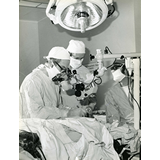
- Title
- Experimental physiological studies by Graeme Clark, assisted by Field Rickards and Don McMahon.
- Type
- Image
- Date
- 1973
- Source
- Graeme Clark
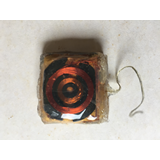
- Title
- With the first University of Melbourne receiver-stimulators
- Type
- Image
- Date
- 1978 - 1979
- Source
- Graeme Clark
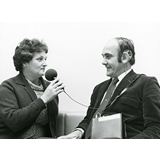
- Title
- Rod Saunders speaks with his wife Margaret with his new wearable speech processor
- Type
- Image
- Date
- 1979
- Source
- Graeme Clark
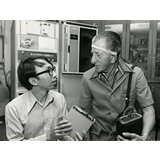
- Title
- Second patient George Watson and Dr. Jo Tong with wearable speech processor
- Type
- Image
- Date
- 1979
- Source
- Graeme Clark

- Title
- Clark with first patient Rod Saunders and Multi-Channel implant
- Type
- Image
- Date
- 1979
- Source
- Graeme Clark
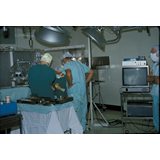
- Title
- Clark supervising a cochlear implant operation at the Royal Victorian Eye and Ear Hospital
- Type
- Image
- Date
- 1979
- Source
- Graeme Clark
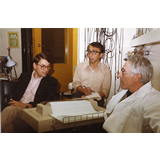
- Title
- Clark extended the neurophysiology with Eric Javel (Boys Town) and Jo Tong
- Type
- Image
- Date
- 1980s
- Source
- Graeme Clark
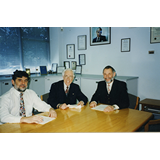
- Title
- Joint Planning Meeting for Industrial Development, Nucleus Ltd, Lane Cove
- Type
- Image
- Date
- 1980s
- Source
- Graeme Clark

- Title
- The First Nucleus receiver-stimulator implanted by Graeme Clark and team
- Type
- Image
- Date
- 1982
- Source
- Graeme Clark

- Title
- Graeme Clark with Cochlear's first multi-channel Nucleus implant he inserted in a patient in 1982
- Type
- Image
- Date
- 1982
- Source
- Graeme Clark
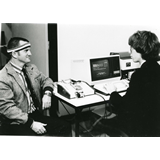
- Title
- Audiologist Richard Dowell tests first Cochlear patient Graham Carrick
- Type
- Image
- Date
- 1982
- Source
- Graeme Clark

- Title
- Clark demonstrating the way to insert the bundle of electrodes around the spiral of the cochlea came through passing grass blades around shells
- Type
- Image
- Date
- 1984
- Source
- Graeme Clark
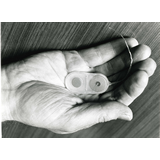
- Title
- Graeme Clark holding the mini-implant developed by Cochlear Ltd
- Type
- Image
- Date
- 1985
- Source
- Graeme Clark
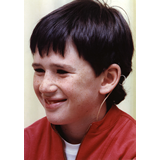
- Title
- Scott Smith the first child (aged 10) to have the Cochlear multi-channel implant in 1985
- Type
- Image
- Date
- 1985
- Source
- Graeme Clark
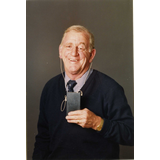
- Title
- Peter Stewart the first in the world to have bilateral cochlear implants
- Type
- Image
- Date
- 1989
- Source
- Graeme Clark
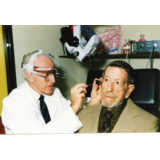
- Title
- Graeme Clark examines his father Colin Milbourne Clark's ear
- Type
- Image
- Date
- 1995
- Source
- Graeme Clark
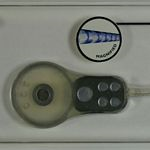
- Title
- Cochlear Implant - Cochlear Limited, 'Nucleus 24', C124M, 1998
- Type
- Image
- Date
- 1998
- Source
- Museum Victoria
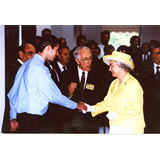
- Title
- Queen Elizabeth II visits the Bionic Ear Institute and meets the first adult (Rod Saunders) and young child (Bryn Davies) who previously had implants
- Type
- Image
- Date
- 2000
- Source
- Graeme Clark
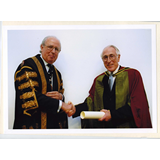
- Title
- Graeme Clark (right) receiving his Honorary Fellowship, Royal Society of Medicine from Sir Barry Jackson
- Type
- Image
- Date
- 2003
- Place
- Royal Society of Medicine, London
- Source
- Graeme Clark
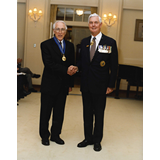
- Title
- Graeme Clark is awarded an AC by the Governor General Sir Michael Jeffrey
- Type
- Image
- Date
- 2004
- Source
- Graeme Clark
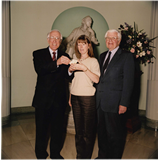
- Title
- Graeme Clark at the Hunterian Museum at the Royal College of Surgeons
- Type
- Image
- Date
- 2010
- Source
- Graeme Clark

- Title
- Graeme Clark with wife Margaret Clark at his conferring as an Honorary Fellow, Royal College of Surgeons, London
- Type
- Image
- Date
- 2010
- Source
- Graeme Clark
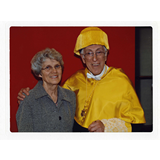
- Title
- Graeme Clark with wife Margaret Clark receiving an honorary doctorate from Zaragoza University, Spain
- Type
- Image
- Date
- 2010
- Source
- Graeme Clark
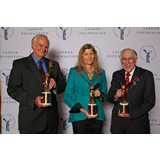
- Title
- Graeme Clark, Ingeborg Hochmaier and Blake Wilson receiving Lasker De Bakey Award in Clinical Medical Research
- Type
- Image
- Date
- 2013
- Source
- Graeme Clark

- Title
- Never Say Never - The Graeme Clark Story
- Type
- Video
- Date
- 2013
- Creator
- Paul Drane Producer/Director
McCarthy, G.J., Roberts, J., Tropea, R., Clark, G.
Created: 20 October 1993, Last modified: 21 February 2024
- Foundation Supporter - Committee to Review Australian Studies in Tertiary Education


